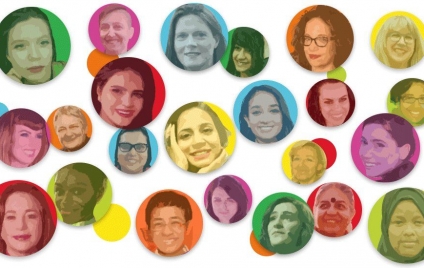The BBC has revealed its list of 100 inspiring and influential women from around the world for 2019.
This year 100 Women is asking: what would the future look like if it were driven by women?
From climate change activist Greta Thunberg, to trans woman Nisha Ayub who was put into a male prison aged 21, many on the list are driving change on behalf of women everywhere. They give us their vision of what life could look like in 2030.
Others, such as the "ghost" politician defying the mafia, and the footballer battling misogyny, are using their extraordinary personal experiences to blaze a path for those who follow.
Congratulations to all selected women. From India 7 powerful, open minded fighters, influencers, entrepreneurs, activists
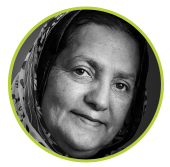 Parveena Ahanger - Indian-admin Kashmir Human rights activist
Parveena Ahanger - Indian-admin Kashmir Human rights activist
Parveena is known as the "Iron lady of Kashmir". Her teenage son disappeared in 1990, at the height of an uprising against Indian rule in Kashmir. He is one of thousands of "disappeared" there - leading Parveena to set up the Association of Parents of Disappeared Persons (APDP). She says she has not given up hope of seeing her son again, with next year marking the 30th anniversary of his disappearance.
"The grief of losing my son to enforced disappearance inspires me to struggle for justice and accountability, and I aspire to work towards making the world a better place, especially for women."
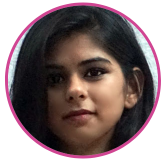 Aranya Johar - India Poet
Aranya Johar - India Poet
Aranya uses beat poetry to address issues like gender equality, mental health and body positivity. Her performance of A Brown Girl's Guide to Beauty has been viewed over three million times on YouTube.
"If women joined the workforce the global GDP could increase by $28 trillion. Why are we limiting half of the world's population and their potential? What could a gender equal world look like? And how far are we from it?"
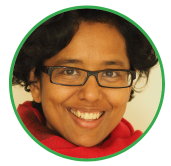 Susmita Mohanty - India Space entrepreneur
Susmita Mohanty - India Space entrepreneur
Hailed as 'India's space woman', spaceship designer Susmita founded India's first space start-up. A passionate climate action advocate, she uses her business to help monitor and understand climate change from space.
"I fear that in three to four generations our home planet will not be very habitable anymore. I hope that humanity will wake up to a Greta-esque urgency for climate action."
 Subhalakshmi Nandi - India Gender equality expert
Subhalakshmi Nandi - India Gender equality expert
Based at the International Center for Research on Women, Subhalakshmi has spent over 15 years working to improve gender equality in Asia. Her focus is the rights of women farmers, ending violence against women and improving women's education.
"My hope for the future is that women will no longer be invisible and uncounted. Women themselves will be organised and will better articulate the work that they do to uphold the entire economy and society. Government data and policy will also respond to the reality of women's work, both paid and unpaid."
 Natasha Noel - India Yoga expert
Natasha Noel - India Yoga expert
Natasha is a yogini, a female master practitioner of yoga and wellness coach. The body positivity influencer often opens up about her traumatic childhood on social media, after losing her mother at the age of three and being the victim of child abuse.
"My hopes for the future are that we live in an empowered world for every human being. Equal opportunities and equal basic liberties...everyone working to improve their emotional intelligence and their intelligence quotient. So empathic and consciously aware humans are created."
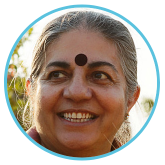 Vandana Shiva - India Environmentalist
Vandana Shiva - India Environmentalist
In the 1970s, she was part of a movement of women who threw their arms around trees to prevent them being felled - the original 'tree-huggers'. Now a world-renowned environmental leader and winner of the Alternative Nobel Peace Prize, the 'ecofeminist' sees women as the custodians of nature.
"I hope that women will lead a transition away from catastrophe and collapse, and sow the seeds of our common future."
 Pragati Singh - India Doctor
Pragati Singh - India Doctor
When qualified doctor Pragati Singh started researching asexuality, she received messages from women who didn't want to have sex but were facing an arranged marriage. So she began organising meet-ups for people looking for non-sexual relationships. She now runs Indian Aces, an online community for asexual people.
"It's time we try increasingly inculcating *feminine* characteristics in our feminism - less 'strong', more 'empathetic'."
How were the 100 Women chosen?
The BBC's 100 Women team drew up a shortlist based on names gathered by them and suggested by the BBC's network of World Service languages teams. We were looking for candidates who had made the headlines or influenced important stories over the past 12 months, as well as those who have inspiring stories to tell, achieved something significant or influenced their societies in ways that wouldn't necessarily make the news. The pool of names was then assessed against this year's theme - the Female Future - and measured for regional representation and due impartiality, before the final 100 were chosen.
Photo copyrights: Karolina Kuras, Hans Jørgen Brun, Nicola Virzì, Sage Sohier, Christian Petersen/Getty Images, Mooreyameen Mohamad, Amelia Allen, Getty Images/Maja Hitij, Getty/Marilla Sicilia, UN, British Swimming, Hauser & Wirth, Oresti, Tsonopoulos, Kawori Inbe, Amal Adam, Matt Kay, Constanza Lavagna, Paula Mitre, Theo Kruse, Venura Chandramalitha, Luis Crispino/Claudia Magazine, Anders Hellberg, Graciela Buffanti, Wakophotography, IBF China, Germana Costanza Lavagna, Neal Hardie, Sharon Kilgannon, Hanna Sotelo, Sumit Kumar Singh, Päivi Mäkelä, Pimienta Films, Siddharth Das, Venura Chandramalitha, Linda Roy by Irevaphotography



